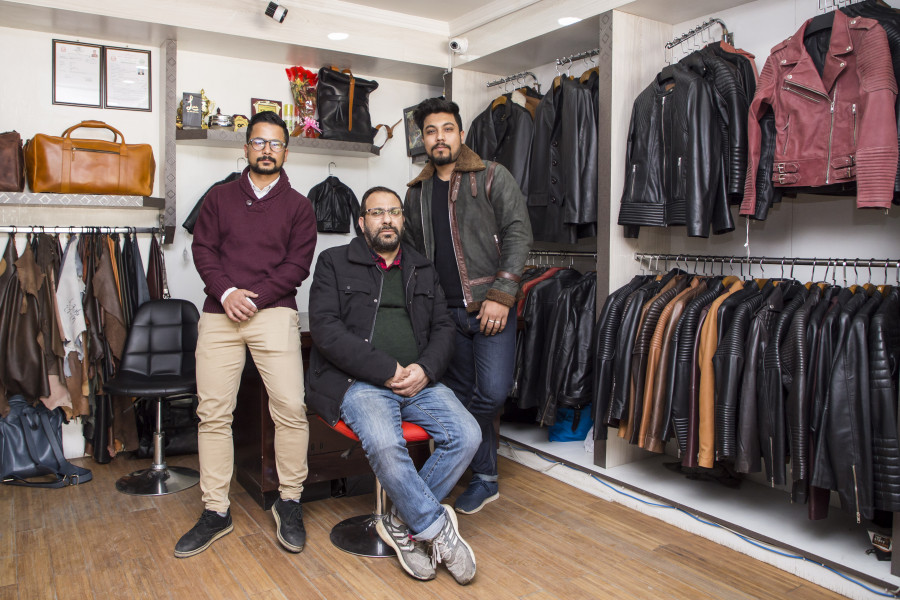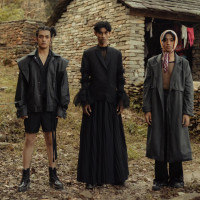Fashion
Bringing leather back
Bilal Ahmed Shah loves his leather jackets. For as long as he can remember, he’s been wearing one.
Marissa Taylor
Bilal Ahmed Shah loves his leather jackets. For as long as he can remember, he’s been wearing one.
“Even as a teenager I used to design and wear my own jacket,” says the 24- year-old entrepreneur. “Your leather jacket is like your oldest companion. Behind every wrinkle, there’s a story to tell.”
Shah demonstrates with the jacket he’s wearing—a rugged, brown leather bomber jacket with faded pockets. “I have been wearing this jacket for such a long time now. This jacket has seen me grow over the years,” he says. “I particularly like this jacket because of its great pockets.”
Pockets—along with the size of the zip, the colour of the buttons, the shade of leather—are matters that are discussed intensively at Latido, Shah’s store in Jhamsikhel, Lalitpur. Established in 2014, Latido has, in a matter of a few years, established itself as an exclusive Nepali brand for chic, custom-designed leather jackets. In many ways, Latido has helped revive the coolness that was once associated with wearing leather.
“Leather jackets were all the rage when my father was young. But it sort of died down, as with most fads. And then came the surge of synthetic leather products, which really disrupted the leather-wearing culture and then the demand for leather plummeted,” says Shah.
With Latido, things seem to be changing. Almost any day you drop by the store, you will see at least a customer or two, trying on a jacket from its range of ready-made well-cut, chicly designed jackets that are on display—from bombers and cafe racers to biker jackets and three stitches. And while some customers come in for the readymade beauties, most come to Latido for its expertly crafted, made-to-order jackets.
“Customers come in with their designs and tell us what they want. We then sit with our pattern masters and they create the jacket,” says Shah.
An order, once placed, takes around 10 days to complete. “If customers are short of time and need jackets immediately, we can try to make the jacket in two days,” says Shah. Prices are charged according to the time it takes to make a jacket. “Some of our customers come up with extravagant design ideas, sometimes a mix of two or four designs into one. These ideas take time to materialise,” he says.
A showcase of the readymade leather jackets available at Latido. Post Photo: Sanjog Manandhar
Every day, Latido makes around 10 different types of jackets. And they are never the same.
“Because our jackets are made-to-order, we have to make new jackets all the time. If we could make the same jacket in bulk then it would be less time-consuming, but it would not have that character or exclusiveness,” says Shah.
All of Latido’s products—which range from bags, wallets, jackets and belts—are made from sheep, goat and buffalo leather. Most of the raw material is brought in from Chennai and Kolkata, in India. “We are also expanding on our product line and making other stuff, basically anything with leather that can be customised,” says Shah.
“Most of our customers, almost 70 percent, come to us through word-of-mouth. If a customer leaves your place happy, they will definitely bring in more business,” says Shah.
Today, Latido sees around a dozen customers—old and new—a day, and one jacket makes him around Rs 14,000-Rs 15,000, which means business is going well.
But it was not always such smooth sailing. “The first two years were a struggle,” says Shah. “But we persevered, and our patience has finally started to pay off.”
For the first two years, Latido operated from a small flat in Jhamsikhel. The flat doubled as a factory and store. “It was only a year and half ago that we decided to launch our own store,” says Shah. The idea for Latido, which means heartbeat in Spanish, did not come to Shah just like that. Nor was it a dream of his to continue with his father’s business.

Latido makes a range of leather products, including jackets, wallets and bags. Post Photo: Sanjog Manandhar
“My dad has been working with this market for many years now. He used to work in the wholesale market,” says Shah. “Growing up, I saw the amount of hard work that my father put in for his business, and the obstacles he had to tackle each day. I never wanted any of it.”
“When I talked to my father about creating a brand name for our products and making exclusive designs, he was skeptical about my business idea. He thought leather would not sell the way I had envisioned,” says Shah. “But I knew that if we show people our vision and value, they would believe in us too.”
Despite getting past all the initial hiccups, one big challenge in running a business, according to Shah, still remains: creating business systems and discipline.
“It has been very tough to make a team of people work in tandem with each other,” says Shah. Latido’s team currently consists five people in administration, two pattern masters, and around 20 people in the factory.
“I was struggling until my childhood friend, Saugat Rijal, joined my team. As COO, he has been instrumental in establishing the company and setting things in order.”
Shah believes his goodwill is the reason Latido has been able to garner a loyal—and wide—client base. “From older people to young boys, from bikers to musicians, we see customers from across the board,” says Shah. Besides orders within the country, Latido sees orders coming in from Australia, the US, South Korea, and Japan. “People are willing to buy our products for our reasonable price and quality. And it’s always nice to wear something that has been made in Nepal,” said Shah.
Shah believes that the only way a company can do well is by creating valued relationships. “Whether it be with customers or with your staff, the key to running a successful business is to ensure you have good relationships with your people,” he says.
Shah also believes that competition is great for business. “Competition helps everyone,” he says. “It divides the market in a good way. It boosts business. Everyone has a different market to capitalise on.
We don’t cater to everyone’s needs. Likewise, there are companies that do not cater to our customers’ needs. Some healthy competition does not hurt anyone.”
For Shah, the goal is to create a global leather brand based in Nepal, and to build a community of like-minded entrepreneurs, who support each other. And the first step to doing that is definitely making a better factory, he says.
As of now, Shah is optimistic about the future. “I have learned great things by getting out of my comfort zone, and Latido is a company that was born out of that,” says Shah.




 9.12°C Kathmandu
9.12°C Kathmandu










